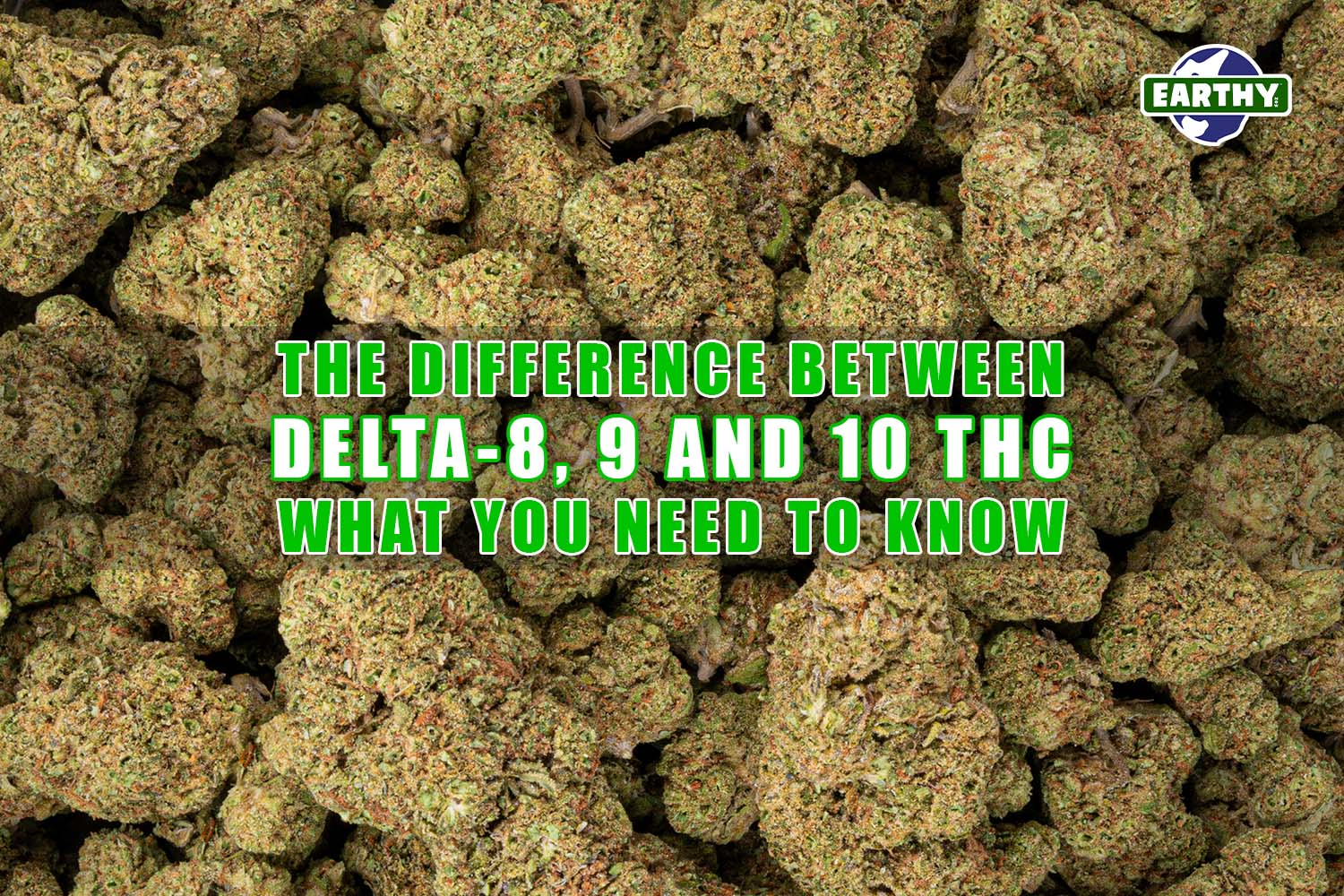The cannabis industry has recently witnessed a surge in interest and research surrounding various compounds of the cannabis plant. Among them, the variants of THC have captivated consumers as new cannabis products flood the market. Delta-8, Delta-9, and Delta-10 THC have garnered particular attention for their diverse effects and legal implications. Here, we’ll delve into the differences between Delta-8, Delta-9, and Delta-10 THC, exploring their benefits, drawbacks, and legal questions.
What are Delta-8, Delta-9, and Delta-10 THC?
The cannabis plant contains various chemical compounds known as cannabinoids. Delta-8, Delta-9, and Delta-10 THC are notable examples. While they share similarities, these compounds differ slightly in their chemical structures and effects on the human body [1]. However, they all have potential benefits and therapeutic attributes. Additionally, a generous swath of the population enjoys these 3 THCs for their varying psychoactive properties and recreational delights. However, they also come with possible adverse effects and legal considerations.
Which is best for you? Explore the differences between Delta-8, Delta-9, and Delta-10
Selecting the appropriate THC variant and product involves careful consideration. For example, it’s crucial to consider the desired effects, dosage, legal status, and product quality. Also, starting with a low dose of any form of THC is important to ensure a good experience [2].
Below, we’ll compare the similarities and differences between Delta-8, Delta-9, and Delta-10 THC to help you understand these cannabinoids in greater detail.
Delta-8 THC
A minor cannabinoid derived from the hemp plant, Delta-8 THC shares a similar chemical formula to Delta-9 THC. However, this isomer has a slightly altered structure [3].
- Reasons for popularity: Ability to offer a milder psychoactive effect than Delta-9 THC. Additionally, many users report a more manageable and less intense high [3].
- Drawbacks and safety concerns: Potential risks include altered senses and safety concerns related to unregulated production [3].
- Products: Available in various forms, including edibles, tinctures, and vape cartridges. These products are commonly marketed for their wellness benefits.
- Legal status: This THC variant falls into a legal loophole in some states due to the Farm Bill focusing explicitly on the legality of hemp-derived Delta-9 THC. Hence, the Bill’s wording makes Delta-8 THC legal at the federal level [4].
Delta-9 THC
The primary psychoactive compound found in cannabis plants, Delta-9 THC is known for its psychoactive effects. As with other cannabinoids, Delta-9 interacts with cannabinoid receptors in the human body’s endocannabinoid system [5].
- Reasons for popularity: Potent psychoactive effects, often resulting in a euphoric high and potential relief [5].
- Drawbacks and safety concerns: Potential risks include impairment of cognitive functions, heightened anxiety. Additionally, the presence of THC metabolites in the body may potentially lead to failed drug tests and legal repercussions [5].
- Products: Available in various marijuana-derived and hemp-derived products. These may include smokable flower, concentrates, and edibles, catering to both recreational and medicinal users.
- Legal status: Considered a controlled substance at the federal level, Delta-9 has stringent regulations on its production and distribution. Due to its psychoactive properties and supposed potential for abuse, federally compliant products’ Delta-9 THC content must be no higher than 0.3 % on a dry weight basis [5].
Delta-9 THC Cigarettes: A New Trend?
Delta-10 THC
A minor cannabinoid with a similar chemical structure to Delta-9 THC, Delta-10 THC is often derived from the hemp plant through a specialized extraction process [6].
- Reasons for popularity: Reportedly provides mild euphoria and psychoactive effects. Anecdotal evidence suggests potential health benefits, though more research is needed.
- Drawbacks and safety concerns: Limited cannabis research exists on its effects and long-term safety, leading to concerns regarding its potential risks, especially when consumed in concentrated forms [7].
- Products: Available in select hemp-derived products, such as tinctures, gummies, and oils. It has the potential to offer similar benefits to Delta-8 and Delta-9 THC [6].
- Legal status: Falls under the purview of the Agriculture Improvement Act, making it federally legal when derived from hemp plants with less than 0.3% Delta-9 THC. Yet, Delta-10 faces ambiguities in some states due to evolving regulations on minor cannabinoids [7].
The benefits of Delta-9 THC
Anecdotal reports and early studies highlight the potential benefits of Delta-9 THC, including its efficacy of effects [8]. As the most potent variant of THC, Delta 9-THC interacts with the body’s endocannabinoid system, modulating sensations. Regarding its psychoactive effects, many users report euphoria, an altered sense of time, relaxation, and relief [1]. However, more research is needed to conclude its efficacy.
The side effects of Delta-9 THC
Consumption of Delta-9-THC may lead to temporary side effects such as dry mouth, red eyes, anxiety, dizziness, and impaired coordination [9]. While these effects are generally mild, individuals should be cautious, especially when using high-potency products.
Legalities: similarities and differences between Delta-8, Delta-9, and Delta-10 THC
Federal law states that Delta-9 THC is legal if derived from hemp and contains less than 0.3% THC per dry weight[10]. However, the legal status of Delta-8 and Delta-10 THC can vary across different states, creating a complex landscape for consumers to navigate.
Due to the stipulations outlined in the 2018 Farm Bill, the legal status of Delta-8 THC and Delta-10 THC can seem nebulous in an evolving cannabis landscape. Though isomers of the primary psychoactive compound, these two cannabinoids exhibit similar altered sensory effects among users. Additionally, they share similar chemical structures with Delta-9 THC [1].
While Delta-9 THC remains classified as a controlled substance, the Farm Bill focuses explicitly on the legal status of hemp-derived cannabinoids and compounds [10]. In other words, the Bill’s focus on Delta-9 concentrations has created a legal loophole for Delta-8 and Delta-10 THC, making them technically legal under certain conditions. However, this legal distinction has led to ongoing debates and regulatory ambiguities [7]. For example, as isomer cannabinoids enter the market, regulators question their compliance with the Bill’s intentions. As a result, these legal nuances blur the lines in certain states [11].
Ongoing discussions about Delta-8 and Delta-10 THC
The emergence of Delta-8 and Delta-10 THC in the legal hemp market has prompted discussions about potential applications and risks. For example, in some circles, individuals have expressed concerns regarding altered senses, potential failed drug tests, and overall safety implications [12]. However, others embrace the legality of these THC variants, highlighting their health-giving attributes and mild effects.
Unlike their counterpart, Delta-9 THC, derived from both the hemp and marijuana plant, these two cannabinoids create a unique regulatory challenge. As they are perceived to fall within the purview of the Farm Bill’s explicit focus on regulating Delta-9 THC, they are considered legal hemp derivatives. Thus, Delta-8 and Delta-10 THC enjoy federal compliance, allowing for their widespread production and distribution [13]. However, the limited understanding of these cannabinoids contributes to the complexities surrounding their legal status.
How Delta-8, Delta-9, and Delta-10 THC are produced
While Delta-9 THC is naturally abundant in cannabis plants, Delta-8 and Delta-10 THC are minor cannabinoids and more scarce. For example, manufacturers procure Delta-8 and Delta-10 through intricate processes, often starting with the extraction of the hemp-derived cannabinoids. While the hemp plant naturally contains minimal percentages of these compounds, specialized extraction methods isolate and concentrate them [14]. Manufacturers use advanced techniques to ensure the final product meets legal and safety requirements.
Full-spectrum THC products
Full-spectrum THC products encompass the wide range of cannabinoids and terpenes in the cannabis plant. This combination encourages the entourage effect, a process wherein the synergy of the various cannabinoids enhances the overall therapeutic potential of the product [16]. Thus, many hemp-derived products may contain Delta-8, Delta-9, and Delta-10 THC, with or without other cannabinoids like CBD.
Using THC safely and responsibly
To ensure a safe and responsible THC experience, users should adhere to recommended dosages [2]. Moreover, individuals are wise to learn about potential side effects. Remember to ask your medical provider about THC consumption if you have anyt questions.
Be sure to source high CBD, low THC products from reputable companies like Earthy Now. Earthy Now provides third-party lab reports, follows legal guidelines, and prioritizes customer safety and satisfaction.
Looking for Delta-8, Delta-9, Delta-10 THC, and THCa products? Visit our friends at www.earthyselect.com!
Key takeaway on D-8, D-9 and D-10 THC
Opting for full-spectrum THC products encompassing various cannabinoids can provide a comprehensive and effective THC experience. Even so, the subtle differences between Delta-8, Delta-9, and Delta-10 THC are not lost on the loyal followers of each THC variant. Thus, trying small doses of different products is the best way to find the right THC variety and products for your tastes and needs. Consumers can make informed decisions by understanding the distinctions between Delta-8, Delta-9, and Delta-10 THC.
Medical Disclaimer / Legal Disclaimer – Information is provided for educational purposes. It does not and is not intended to constitute legal or medical advice. We attempt to be accurate and up-to-date, but the legality of cannabinoids and the science of cannabis are evolving. The author is neither a legal professional nor a medical expert. Before buying or using any products, you should check with your local authorities and medical providers.
References
- Delta-8 vs. Delta-9 vs. Delta-10: What’s the Difference?
- How Much Delta-8 is Equal to Delta-9?
- How Delta-8 THC Works
- Will the US Regulate Delta-8?
- What is Delta-9 THC?
- What is Delta-10 THC, and What Can It Do?
- Delta- 8 and Delta-10 THC Have Flooded the US Market
- The Immune Effects of THC
- Understanding Delta-9 THC
- Hemp Production and the 2018 Farm Bill
- The CFA Urges Congress to Close the Synthetic Cannabinoid Loophole
- Does Delta-8 Show Up On a Drug Test?
- The Paradoxical Legality of Delta-8 and Delta-9 THC
- Extracting THC
- Forbes: Delta-8, Delta-9, and Delta-10- What’s the Difference?
- Full-spectrum versus Broad-spectrum Cannabis Products
- Delta-10 vs Delta-8: What’s the Difference?






